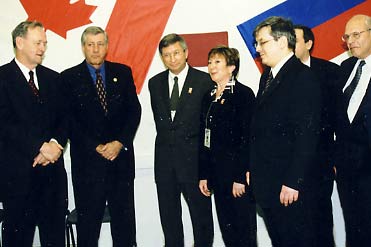By Cathy Carlyle
Jean Chrétien at a "townhall" meeting with the students of HSE, which followed the centre's opening
Who would have thought a couple of decades ago that such a capitalist subject as "corporate governance" would attract the interest of Russian government officials, top managers, professors and students? Yet today York's Schulich School of Business (SSB) is successfully running a major corporate governance training program in Russia, financed by the Canadian International Development Agency (CIDA).
Schulich's Dean Dezsö Horváth has recently returned from Moscow where he joined Prime Minister Jean Chrétien and 10 provincial premiers at the opening of the new facilities of the Canada-Russia Corporate Governance Centre. The centre is at SSB's partner institution, the State University - Higher School of Economics (HSE) in Moscow. Through this centre Schulich and the HSE work closely together to offer courses, seminars and other educational programs on governance issues.
The centre's opening marked an important milestone in Schulich's three-year Russia-Canada Corporate Governance Program (RCGP). "It demonstrated that the HSE and other key Russian organizations recognize the importance of better corporate governance practices for the future development of the Russian economy," said Alina Pekarsky, Schulich's project director of Russian corporate governance training.
Russian media interested
"News of the centre's opening and Schulich's program generated wide coverage in the Russian business world and the media. Russians see our program as creating a better investment climate in that country. Governance education can make a major contribution to this," she said.
Schulich came up with the idea of developing a corporate governance training program for Russia in 1998, just at the time when the Russian financial system experienced a major breakdown, "due in large measure to bad governance practices in the newly-privatized companies," said Pekarsky. "In effect, Schulich responded to marketplace needs, as it had in previous years when it restructured itself as a global business school."
In the early 1990s, SSB created Canada's first international master of business administration degree and started the East/West Enterprise Exchange Program for the countries of the former Soviet Union and the Eastern block. The East/West program, with some 580 graduates, was headed by Professor Rein Peterson, who later became executive director of the RCGP.
"Based on a sound understanding of Russian needs, a team of senior Schulich professors approached CIDA with a proposal to build the capacity of Russian institutions of higher education to conduct corporate governance training for corporate directors, government officials and future business leaders," said Pekarsky.

Dignitaries in the Canada Room at the official opening of the Canada-Russia Corporate Governance Centre in Moscow. From left: Jean Chrétien; Mike Harris, Dezsö J. Horváth, Alina Pekarsky, Yaroslav Kouzminov, rector of the State University Higher School of Economics, Andrei Kouznetsov, vice-rector, and Peter Bartha
"The team pointed out that surveys indicate that virtually no Russian management schools and training centres provide courses in corporate governance due to the absence of qualified instructors. So they argued that the paramount need is to train the trainers."
She said there was little understanding of corporate governance in Russia. "For most Russian professors, teaching 'governance' meant teaching business management. We had to establish that 'governance' means the expression of the owners' interests and concerns through the activities of the boards of directors - a totally new idea for Russians."
Schulich recruits strong partner
York's James Gillies, a prominent SSB professor emeritus, took the lead role with Peterson in developing the CIDA proposal. And when CIDA agreed to support the project, a Schulich team led by Horváth went to Moscow to recruit a strong Russian partner institution, "hence the Schulich School of Business-Higher School of Economics linkage which has worked so well in the first two years of the program," said Pekarsky.
In response to Gillies' suggestions, the primary focus of the Schulich program has been to train the trainers. In each of the three-years of the program, 20 Russian academics are selected on a competitive basis for a Canadian fellowship that brings them over to York for a month-long summer course conducted in English at a postgraduate level.
The course, developed by the program's academic director Peter Bartha, brings together professors from Schulich and other Canadian business schools as well as leading Canadian business people and government officials. The Russian participants receive instruction, listen to guest speakers, debate, conduct research and prepare course materials that will enable them to teach corporate governance back home.
Announced through the Internet and Russian academic and professional organizations, the York program has attracted a great deal of interest. A rigorous process of personal interviews and reviews are behind the selection of the 20 participants each year. Pekarsky notes that those chosen are highly qualified and motivated.
"After their return to Russia we have seen corporate governance courses multiply and a number of executive seminars offered by our graduates from Russia. The participants have remained in touch with each other, from Kaliningrad in the west to Vladivostok in the Russian far east."
The recently-opened centre in Moscow is the hub for the Russian graduates, providing them with teaching and research support and enabling them to maintain contact with the Schulich faculty. "Corporate governance education in Russia is clearly on the upswing," said Pekarsky.